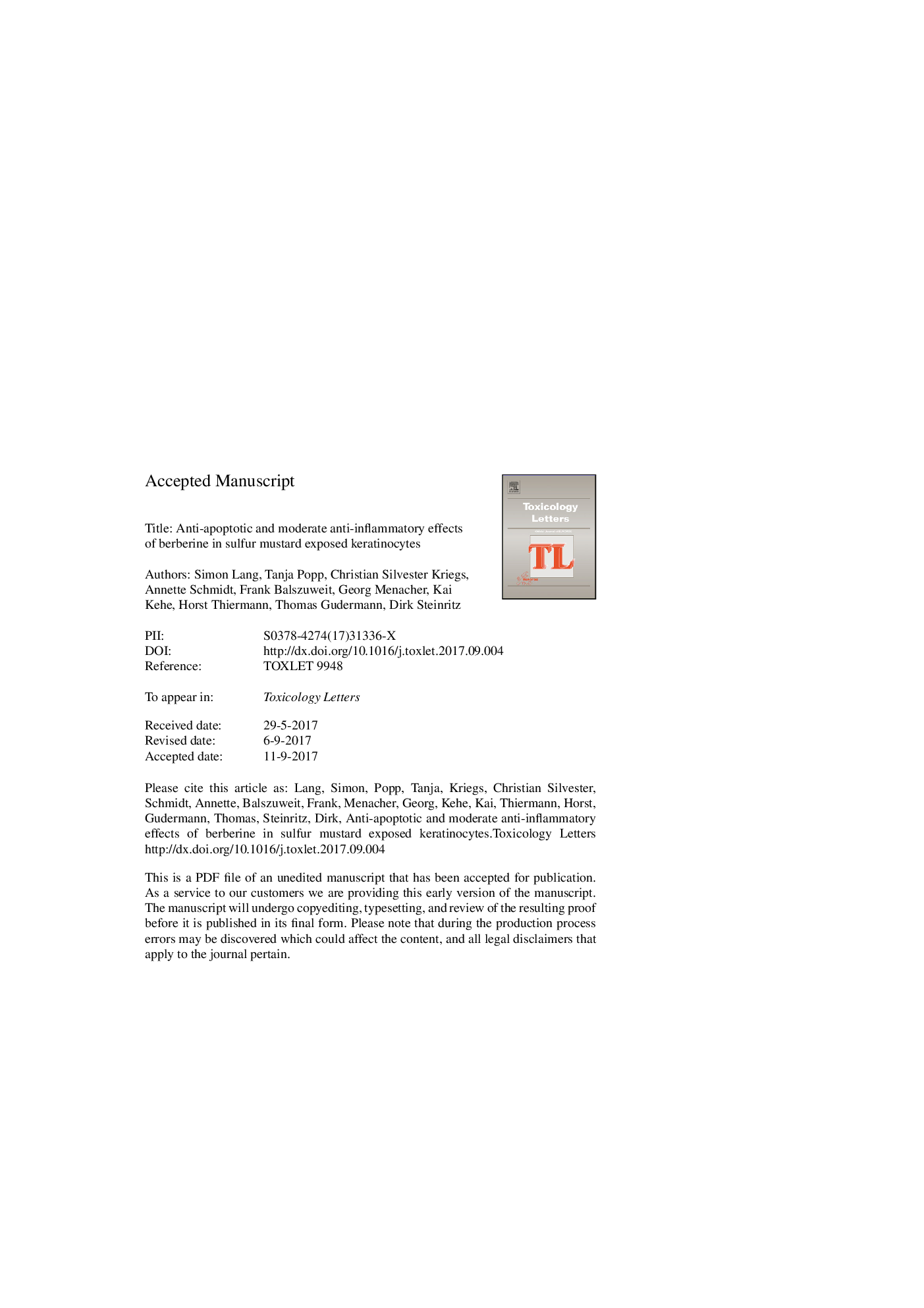| کد مقاله | کد نشریه | سال انتشار | مقاله انگلیسی | نسخه تمام متن |
|---|---|---|---|---|
| 8553159 | 1562579 | 2018 | 22 صفحه PDF | دانلود رایگان |
عنوان انگلیسی مقاله ISI
Anti-apoptotic and moderate anti-inflammatory effects of berberine in sulfur mustard exposed keratinocytes
ترجمه فارسی عنوان
اثرات ضد التهابی ضد آپوپتوزی و متوسط ضدبارداری بربرین در گوگرد خردل در معرض کراتینوسیت ها
دانلود مقاله + سفارش ترجمه
دانلود مقاله ISI انگلیسی
رایگان برای ایرانیان
کلمات کلیدی
MOCIL-8IL-6DMEMFBSHaCaTTHP-1COCBERDulbecco’s modified Eagle medium - Modified Eagle اصلاح شده DulbeccoROS - ROSAdenylate kinase - آدنیلات کینازenzyme linked immunosorbent assay - آنزیم تست ایمونوسیورسانس مرتبط استinterleukin 6 - اینترلوکین 6Interleukin 8 - اینترلوکین 8Berberine - بربرینELISA - تست الیزاPharmaceutical - داروییfetal bovine serum - سرم جنین گاوCytotoxicity - سمیت سلولیSulfur mustard - سولفور موستارد یا گاز خردلCo-culture - همکاری فرهنگیReactive oxygen species - گونههای فعال اکسیژن
موضوعات مرتبط
علوم زیستی و بیوفناوری
علوم محیط زیست
بهداشت، سم شناسی و جهش زایی
چکیده انگلیسی
Skin affections after sulfur mustard (SM) exposure include erythema, blister formation and severe inflammation. An antidote or specific therapy does not exist. Anti-inflammatory compounds as well as substances counteracting SM-induced cell death are under investigation. In this study, we investigated the benzylisoquinoline alkaloide berberine (BER), a metabolite in plants like berberis vulgaris, which is used as herbal pharmaceutical in Asian countries, against SM toxicity using a well-established in vitro approach. Keratinocyte (HaCaT) mono-cultures (MoC) or HaCaT/THP-1 co-cultures (CoC) were challenged with 100, 200 or 300 mM SM for 1 h. Post-exposure, both MoC and CoC were treated with 10, 30 or 50 μM BER for 24 h. At that time, supernatants were collected and analyzed both for interleukine (IL) 6 and 8 levels and for content of adenylate-kinase (AK) as surrogate marker for cell necrosis. Cells were lysed and nucleosome formation as marker for late apoptosis was assessed. In parallel, AK in cells was determined for normalization purposes. BER treatment did not influence necrosis, but significantly decreased apoptosis. Anti-inflammatory effects were moderate, but also significant, primarily in CoC. Overall, BER has protective effects against SM toxicity in vitro. Whether this holds true should be evaluated in future in vivo studies.
ناشر
Database: Elsevier - ScienceDirect (ساینس دایرکت)
Journal: Toxicology Letters - Volume 293, 1 September 2018, Pages 2-8
Journal: Toxicology Letters - Volume 293, 1 September 2018, Pages 2-8
نویسندگان
Simon Lang, Tanja Popp, Christian Silvester Kriegs, Annette Schmidt, Frank Balszuweit, Georg Menacher, Kai Kehe, Horst Thiermann, Thomas Gudermann, Dirk Steinritz,
